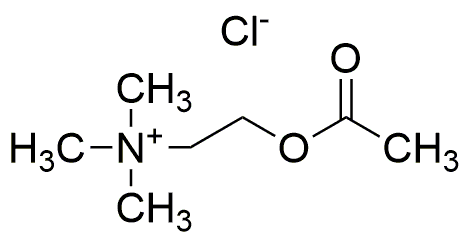Acetylcholine chloride is widely utilized in research focused on:
- Neuroscience Research: It serves as a key neurotransmitter in studies investigating synaptic transmission and neurophysiology, helping researchers understand brain functions and disorders.
- Pharmacological Studies: This compound is crucial for testing the effects of drugs on cholinergic systems, providing insights into potential treatments for conditions like Alzheimer's disease and myasthenia gravis.
- Muscle Physiology: Used in experiments to stimulate muscle contractions, it aids in understanding muscle function and the mechanisms of neuromuscular diseases.
- Cell Culture Applications: Acetylcholine chloride is employed in cell culture systems to study cellular responses to neurotransmitters, enhancing the development of neuroprotective therapies.
- Biochemical Assays: It is utilized in various assays to measure cholinesterase activity, which is important for assessing pesticide exposure and developing antidotes for poisoning.
General Information
Properties
Safety and Regulations
Applications
Acetylcholine chloride is widely utilized in research focused on:
- Neuroscience Research: It serves as a key neurotransmitter in studies investigating synaptic transmission and neurophysiology, helping researchers understand brain functions and disorders.
- Pharmacological Studies: This compound is crucial for testing the effects of drugs on cholinergic systems, providing insights into potential treatments for conditions like Alzheimer's disease and myasthenia gravis.
- Muscle Physiology: Used in experiments to stimulate muscle contractions, it aids in understanding muscle function and the mechanisms of neuromuscular diseases.
- Cell Culture Applications: Acetylcholine chloride is employed in cell culture systems to study cellular responses to neurotransmitters, enhancing the development of neuroprotective therapies.
- Biochemical Assays: It is utilized in various assays to measure cholinesterase activity, which is important for assessing pesticide exposure and developing antidotes for poisoning.
Documents
Safety Data Sheets (SDS)
The SDS provides comprehensive safety information on handling, storage, and disposal of the product.
Product Specification (PS)
The PS provides a comprehensive breakdown of the product’s properties, including chemical composition, physical state, purity, and storage requirements. It also details acceptable quality ranges and the product's intended applications.
Certificates of Analysis (COA)
Search for Certificates of Analysis (COA) by entering the products Lot Number. Lot and Batch Numbers can be found on a product’s label following the words ‘Lot’ or ‘Batch’.
Numéro de catalogue
Numéro de lot/série
Certificates Of Origin (COO)
This COO confirms the country where the product was manufactured, and also details the materials and components used in it and whether it is derived from natural, synthetic, or other specific sources. This certificate may be required for customs, trade, and regulatory compliance.
Numéro de catalogue
Numéro de lot/série
Safety Data Sheets (SDS)
The SDS provides comprehensive safety information on handling, storage, and disposal of the product.
DownloadProduct Specification (PS)
The PS provides a comprehensive breakdown of the product’s properties, including chemical composition, physical state, purity, and storage requirements. It also details acceptable quality ranges and the product's intended applications.
DownloadCertificates of Analysis (COA)
Search for Certificates of Analysis (COA) by entering the products Lot Number. Lot and Batch Numbers can be found on a product’s label following the words ‘Lot’ or ‘Batch’.
Numéro de catalogue
Numéro de lot/série
Certificates Of Origin (COO)
This COO confirms the country where the product was manufactured, and also details the materials and components used in it and whether it is derived from natural, synthetic, or other specific sources. This certificate may be required for customs, trade, and regulatory compliance.


